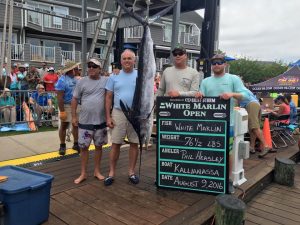
OCEAN CITY — After roughly 10 months of legal wrangling and a nine-day trial in May, a federal judge on Wednesday ruled the winner of the white marlin division in the White Marlin Open was not entitled to the record $2.8 million payout after opining the angler, captain and crew were indeed deceptive on post-tournament polygraph exams.
Last August, tournament officials discovered a potential rules violation that would ultimately disqualify the winner in the white marlin division, a 76.5-pounder caught by angler Phillip Heasley on the Kallianassa out of Naples, Fla. Heasley’s 76.5-pound white marlin was awarded a tournament-record $2.8 million in prize money because the Kallianassa was entered across the board in all added entry levels and the fact it was lone qualifier.
On Wednesday, U.S. District Court Judge Richard Bennett ruled Heasley and the Kallianassa should be disqualified because of the apparent deception on the required polygraph exams.
“Ultimately, this Court concludes that Mr. Heasley’s arguments are without merit,” the judge’s opinion reads. “The White Marlin Open complied with its obligations and did not breach the Tournament Rules contract as a matter of law. Consequently, Mr. Heasley’s performance under that contract was not excused. By failing to satisfy the Tournament Rules’ polygraph requirement, Heasley himself failed to perform under the contract and is not entitled to the prize money.”
Perhaps more importantly, the judge ruled the winning angler and boat violated a critical tournament rule regarding the timing of the catch of the first-place marlin, which came to light after the discrepancies in the polygraph exams were revealed. Per tournament rules, participating boats cannot start fishing before 8:30 a.m. on any of the fishing days and judge ruled on Wednesday the evidence and testimony showed the Kallinassa was fishing before 8:30 a.m. last August 9 when the winning white marlin was caught.
“Apart from this legal ruling, this court finds as a matter of fact that Mr. Heasley and the crew of the Kallianassa violated an important Tournament rule which disqualifies their catch of the 76.5 pound white marlin. Specifically, it is clear from the evidence and testimony presented in this case that the Kallianassa’s fishing lines were deployed and in the water before 8:30 a.m. on Tuesday, August 9, 2016.”
WMO officials announced potential rules violations regarding the timing of the catch two weeks after the tourney and that Heasley and three other individuals on the Kallianassa including the captain and two mates were deceptive on their answers to some of the questions during the requisite post-tournament polygraph examinations for the winners in major categories.
On its Facebook page and website Wednesday afternoon, the White Marlin Open issued a lengthy statement. It read in part, “In a two-week trial, White Marlin Open put on evidence of the appropriateness of the polygraph examinations, and the reasonableness of its actions in withholding the prize money under the tournament rules. The court verified that White Marlin Open, Inc., had applied its rules in a fair manner, had the authority to impose the polygraph upon its participants as a way to verify that rules of the tournament were not violated by the winning anglers.
“Throughout the case, the intention of the White Marlin Open directors has been to protect the integrity of the tournament and to ensure that the rules are applied fairly for all participants. The White Marlin Open, like many other tournaments, has found that the use of polygraphs is an effective method of ensuring compliance with the rules. The White Marlin Open is pleased that its reputation for integrity, built over its forty-three-year history, has been upheld.
“As the 2017 tournament approaches, the tournament directors are determined to continue the fair and impartial application of the tournament rules so that all participants have confidence in the results of the tournament. The tournament directors are committed to maintaining the tournament as an open and enjoyable experience for all anglers, whether professional or amateur, who participate in this world recognized event.”
In August, WMO officials through their attorneys filed a Complaint for Interpleader in Worcester County Circuit Court, asking a judge to intercede and decide first if there were rules violations committed by Heasley and the Kallianassa crew, and secondly, if there were violations, how best should the $2.8 million in prize money be distributed to the winners in other categories.
The interpleader case was ultimately moved to U.S. District Court and after months of legal wrangling, the trial began May 22 and continued for nine days. Boiled down to its simplest terms, the Interpleader asserted Heasley, Captain David Morris and mates Kyle Bohannon and Joseph Hagen, the only four people on the “Kallianassa” on Aug. 9 when the winning white was caught, each failed polygraph tests after administrators determined they were deceptive in their answers to some questions regarding the time of the catch. Per tournament rules, any place-winner with prize money of $50,000 or more may be required to submit to polygraph examinations on the Saturday after the tournament concluded.
Wednesday’s ruling did not specify how the prize money will be distributed.
According to earlier court documents, the one and only blue marlin that qualified during the tournament, a 790-pounder with a severed tail would gain another $254,620, nearly doubling its $258,995 already awarded and bringing its total to $513,615. The biggest gainer could be the first-place tuna, a 236.5-pounder, which could see its total prize soar to over $3 million, which would shatter all previous WMO records.
The second-place tuna gain an additional $140,509 to go along with its $131,968 in initial prize money. The two boats that tied for third in the tuna division would each gain an additional $47,190 and the remaining winners in the dolphin, wahoo and shark categories would each be awarded an additional $2,125
This story will be updated.

